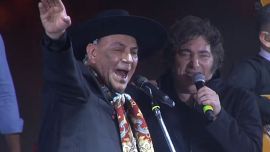With her bright green Aymara skirt billowing, Lidia Flores throws herself from the second cord of the ring into the air and smashes into her male opponent.
The “cholita” fighters return to the club Sharks of the Ring, after the two-week-long suspension due to the protests and blockades in El Alto, an expanding city neighbouring the Bolivian capital La Paz.
A noisy amalgam of older men, young women, and parents of young children scream and shout expletives while the indigenous fighters face off.
Dressed in polleras, traditional layered skirts, and long braids, the female fighters flip, kick, hit, and pull hair, in a chaotic show which sometimes spills out of the ring.
Flores, known in this world as “Dina, Queen of the Ring,” says that the lucha libre is a balm for the pressure she bears daily in her work as a restaurant cook.
“The fight de-stresses me,” claims the 44-year-old, while handing out flyers advertising a nearby street market to passers-by, shortly before the start of the show
'Accesible therapy'
After a forced hiatus of 15 days, this mother of three, who has spent 12 year in the ring, feels “very anxious” to return to it.
“With these problems, with so many blockades, in which there was nothing to eat, it was very stressful,” she says, in the black bowler hat worn by indigenous women.
The protests after the October 20 presidential elections were driven by the opposition who accused Evo Morales of committing electoral fraud to be reelected. For the inhabitants of El Alto, a bastion of the now ex-president which rests more than 4,000 metres above sea level, it made their lives difficult and even put them in danger.
The blockade of a fuel plant turned into a butchery. Eight people died when law enforcement clashed with the protestors.
Two days later, the police launched tear gas against a march in La Paz, in which the protestors carried five of the coffins of the dead to demand justice and the resignation of the interim president, Jeanine Áñez, who declared herself in charge after the November 10 resignation of Morales, who went into exile in Mexico.
“It was the first time [in eight years] that we had to stop for a conflict,” explained the organizer of the show, 30-year-old Marie Peñaranda, while selling tickets for 20 bolivianos (around US$3) each.
The tensions relaxed during the weekend after the approval of a law to hold new elections and the talks held by the provisional government and protestors to end the riots.
Ana Luisa Yujra, better known in the ring as “Jhenifer Two Face,” says that the show is an “accessible” therapy for people after all the violence.
“I love to show the ability, agility, and capacity that a woman can have,” says the geriatric nurse by-day, wrestler by-night.
'Rude but interesting'
Flores, dressed in a shawl of the same flashy green, climbs into the ring and flings her bowler hat to the floor.
In her preparation for the mixed pairs combat against Yujra, the fighter performs a couple somersaults which expose the layers of her pollera and her underclothes.
28-year-old Martha Mayta sits in the first row, captivated by the spectacle.
“I like how they fight, how they use their rapiers, with the polleras, it’s incredible; it makes me think how women in pollera can fight in these positions.”
“It’s a demonstration for us that a woman can defend herself from men,” explained 34-year-old Norah Martínez.
“It seems rude, but it’s something interesting.”
After a match sprinkled with references to the political crisis, Yujra and her male partner, dressed in bright red pants and a matching t-shirt, are declared the winners.
Visibly exhausted and dishevelled, Flores blows kisses to her fans while heading from the ring to the improvised dressing room.
“I feel badly,” she says. “I am really tired and breathless.”
by Allison Jackson, AFP

















Comments